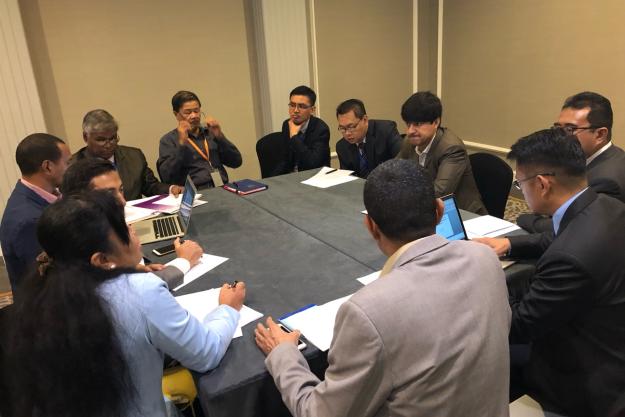
THE HAGUE, Netherlands — 19 April 2019 — Representatives of National Authorities from Asia met with security and legal experts to bolster the application of legal measures in tackling the chemical terrorism threat at a workshop in Kuala Lumpur, Malaysia, from 9 – 11 April.
The Chairman of the National Authority of Malaysia, H.E. Ambassador Dato Ilankovan Kolandavelu, opened the event about the role of the Chemical Weapons Convention’s (CWC) implementing legislation in addressing threats posed by non-State actors. He stressed that the risk of terrorists acquiring and misusing toxic chemicals constitutes a serious threat to peace and security in the region and noted: “Thriving chemical industry in Asia, along with the influx of chemical imports entering and moving within the region, requires vigilance against potential misuse of these goods, especially by various terrorist groups.”
He also underlined the significance of effective CWC implementation by all relevant stakeholders at the national level. Ambassador Kolandavelu added that raising awareness among the general public may also facilitate a better understanding of the nature of the threat and of the role of the Convention in addressing it.
Malaysian Deputy Foreign Minister Dato Haji Marzuki Yahya further highlighted “the importance of inter-agency coordination and cooperation at the regional and national levels in securing toxic chemicals from possible misuse by non-State actors”.
The OPCW’s Technical Secretariat provided a detailed description of the CWC provisions that must be adopted for national implementing legislation to serve as an effective tool in addressing the threat of chemical terrorism. The Organisation’s representatives also clarified how Article VI of the Convention may be used to prevent possible hostile use of toxic chemicals, and provided an overview of the OPCW’s programmes focusing on non-State actors and chemical terrorism.
The participants highlighted the need for technical assistance in areas such as: reviewing existing legislation, developing chemical security guidelines, customs procedures, developing emergency preparedness and response plans, and laboratory analysis. They further emphasised the need to increase the readiness and inter-operability of all relevant agencies in the event of a chemical weapons attack.
The meeting allowed the participants to exchange views on the threat of chemical terrorism, and draw parallels between their obligations under the CWC and other international treaties that counter terrorism. The attendees also explored national measures to control toxic chemicals and advance coordination among national stakeholders, as well as the most effective ways of using existing legal mechanisms to ensure the effective prohibition of the activities banned under the CWC.
Additionally, representatives and partners from the UN Office on Drugs and Crime, 1540 Committee, World Customs Organization, Interpol, Southeast Asia Regional Center for Counter-Terrorism, UN Interregional Crime and Justice Research Institute, EU CBRN Centres of Excellence Regional Secretariat for Southeast Asia, and Australia shared their expertise and described their programs in support of state efforts to counter the threat of chemical terrorism.
The workshop was attended by representatives from: Afghanistan, Bangladesh, Brunei Darussalam, Indonesia, Iraq, Malaysia, Myanmar, Nepal, Papua New Guinea, Philippines, Sri Lanka, and Timor-Leste.
Background
As the implementing body for the Chemical Weapons Convention, the OPCW, with its 193 Member States, oversees the global endeavour to permanently eliminate chemical weapons. Since the Convention’s entry into force in 1997, it is the most successful disarmament treaty eliminating an entire class of weapons of mass destruction.
Over 96% of all chemical weapon stockpiles declared by possessor States have been destroyed under OPCW verification. For its extensive efforts in eliminating chemical weapons, the OPCW received the 2013 Nobel Peace Prize.
